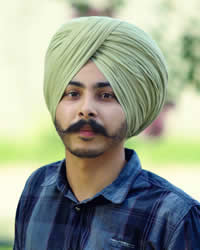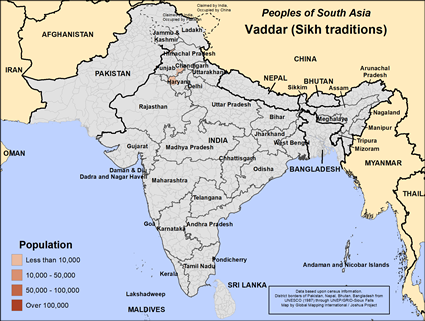Vaddar (Sikh traditions) in India

Photo Source:
wallpaperflare
Creative Commons
|

Map Source:
People Group data: Omid. Map geography: UNESCO / GMI. Map Design: Joshua Project
|
| People Name: | Vaddar (Sikh traditions) |
| Country: | India |
| 10/40 Window: | Yes |
| Population: | 1,900 |
| World Population: | 1,900 |
| Primary Language: | Punjabi, Eastern |
| Primary Religion: | Other / Small |
| Christian Adherents: | 0.00 % |
| Evangelicals: | 0.00 % |
| Scripture: | Complete Bible |
| Ministry Resources: | Yes |
| Jesus Film: | Yes |
| Audio Recordings: | Yes |
| People Cluster: | South Asia Sikh - other |
| Affinity Bloc: | South Asian Peoples |
| Progress Level: |
|
Introduction / History
For most of their history the Vaddar (aka, Bovi) people wandered the subcontinent looking for jobs to support their families. The word Bhovi means "earth-digger". During the Partition of 1947, the Muslim Vaddars tended to move to Pakistan while the Hindu and Sikh Vaddars remained in India. The large majority of the Vaddars (aka, Bhovi) are Hindus but there are also a sizable number of Muslims and a small group of Sikhs.
Where Are they Located?
Sikh Vaddar people live in Punjab, the original homeland of Sikhism.
What Are Their Lives Like?
The traditional occupations of the Vaddars have been as stonecutters, diggers of wells and canals and as transporters of earth and stones. Many Vaddars now have settled in villages and work as farm laborers on other people's land. The primary language of the Muslim Vaddars in Pakistan is Oadki. Many also speak Punjabi and Urdu, which allow them to speak with others outside their group.
The Vaddars of Pakistan and India are endogamous, that is, they marry within their own community. The Vaddar women have a role in the economic, social and religious spheres of their community and contribute to the family income. Caste councils promote their interests and settle legal disputes.
What Are Their Beliefs?
Most Vaddar people are members of other religious communities, but a small number are Sikhs. Sikhism originated from a 15th century teacher named Guru Nanak Dev as a reform movement. He rejected the Hindu caste system, taught that all people were equal and that all have equal access to God. The Sikh God is formless, without gender and is to be found in everyone. One gets closer to God by living a good life and by practicing charity. Like Hindus, Sikhs believe in reincarnation and the law of karma; you reap what you sow in your previous life. Like Muslims, the Sikhs worship only one God.
One may recognize a Sikh man by his distinctive turban. All the 10 great Sikh gurus wore turbans. Sikh teaching mandates that a person not cut his or her hair. They worship their holy book, the Granth Sahib, which is a collection of hymns.
There are roughly the same number of Sikhs as there are Jews in the world, but Sikhs are most concentrated in Punjab, their homeland. However, you will find smaller numbers of Sikhs all over the world. Many of the best Indian restaurants in the West are owned and operated by Sikhs.
What Are Their Needs?
Sikh Vaddar people need to put all their trust in Jesus Christ, the only one who can forgive sin and offer abundant life.
Prayer Points
Pray for the Holy Spirit to give Sikh Vaddar people teachable and understanding hearts.
Pray that a strong movement of the Holy Spirit will bring entire Sikh Vaddar families into a rich experience of God's blessing.
Pray for Sikh Vaddar families to be drawn by the Holy Spirit to seek forgiveness, and to understand the adequacy of Christ's work on the cross.
Pray for teams of believers to do sustained, focused prayer for the Lord to open the hearts of Sikh Vaddar family leaders to experience God's blessing through a movement of family-based discovery Bible studies.